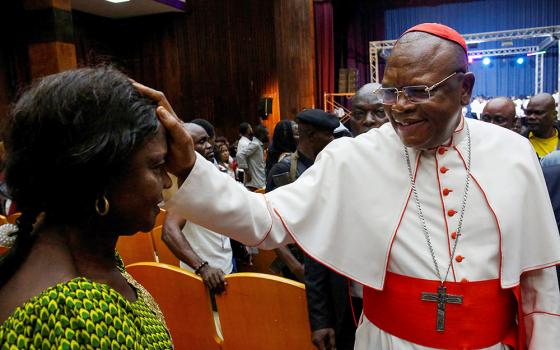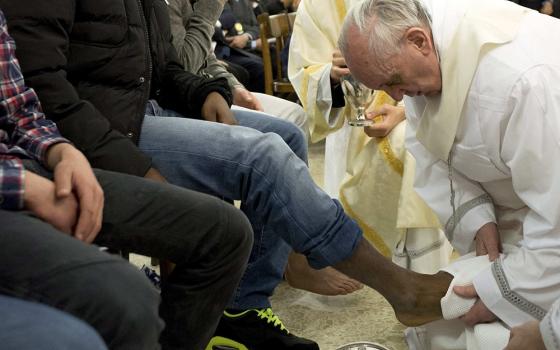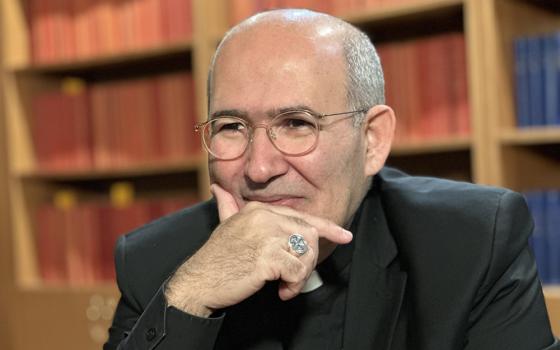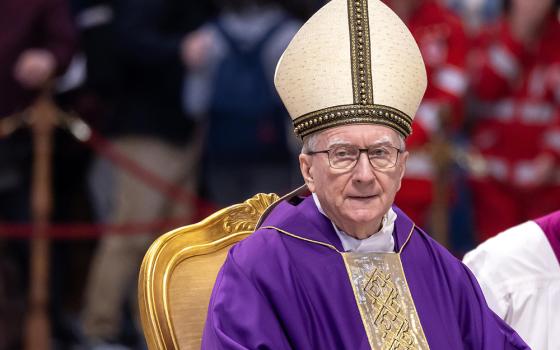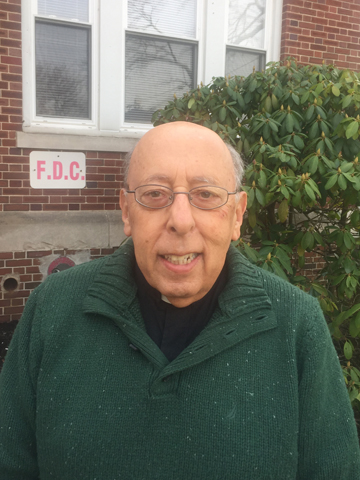
Fr. Ron Cioffi
Fr. Ron Cioffi
Age: 75
Lives in: St. Joseph Parish, Keyport, N.J.
Sr. Camille: You recently afforded me the pleasure of conducting a mission in your parish of St. Joseph in Keyport. It was apparent that your parishioners hold you in high regard and regret that your term as pastor is coming to an end. What have you learned from them?
Cioffi: Each life situation (married, single or sexual minority person) brings with it both common and then specific sets of "issues." Among the common elements: the stress of daily life, the well-known particular demands of marital relationships, the classic issues of parenthood, the issues that develop for the "care-giving generation," volatile economic situations and the like. The preoccupations these life situations impose on individuals and personal relationships easily crowd out the time, energy, and atmosphere necessary for most people to develop deeply reflective life-styles with their consequent social benefits. Life is lived on the run for a significant number of people. Thus I have learned the necessity of developing pastoral patience and of letting parishioners take the lead in how a community ought to grow according to its inherent personality. How and to what extent can the Gospel's good news -- both comforting and demanding -- best be made available to each particular community? How can we communicate, and sustain gospel values and faith and hope? These need to be each day's intention. Perhaps the saying is worn out but its truth is that enduring, pastoral relationships bear fruit best and continuously when they are rooted in prayer, reflection, conversation and dialogue.
How long have you served there?
I came to St. Joe's in the summer of 1981 and became pastor in 1989.
Can you cite any particular accomplishments?
A difficult question and a somewhat embarrassing question. It can open up several layers of one's life and his or her matrix of relationships. You mentioned in your opening comment that "your parishioners hold you in high regard." I think that comment is about as good an answer as I can offer to your question. I must confess that I was a bit startled by its seemingly implied broad consensus. To perhaps try harder, I might cite the institution of our Lenten Retreat of which you were this year's facilitator, and recognizing the zeal and talent of Ms. Tonie Malone who approached me about starting a twinning relationship with a Haitian parish twenty-two years ago. Both are flourishing with grand parish-wide support.
Who have been your collaborators in this ministry?
The Sisters of Mercy -- leading and staffing our parish primary grade school for over 100 years until its closing in 2009. There have been many lay members of the parish that have been very fruitful servants of the parish's life and mission. Of course, this is true in every parish. They serve in a variety of capacities: lectors, eucharistic ministers both at Mass and to the homebound, and to hospitalized persons and patients in other care facilities, choirs, the St. Vincent de Paul Society, the Haiti Outreach and Parish Twinning Committee, the Parish Mission Team, the Parish Leadership Council, the Finance Committee, volunteers in the Parish Health and Wellness Ministry, and the Lazarus Ministry.
Do any of your partners in these ministries stand out for their compassionate service?
Fr. Cyril Robert Johnson, especially, has been an invaluable and delightful associate pastor here at St. Joseph's for several years. He is involved in every aspect of parish life. Timothy and Barnabas couldn't have been more involved in the community's life in concert with Paul, a true gift to St. Joseph's!
Tonie Malone, a marvelous woman of faith and apostolic zeal, she fits in easily with the memorable women in the Book of Acts like Dorcas in Acts 9:36-42, Lydia in Acts 16:14-15, and Lois and Eunice in 2 Timothy 1:5. Tonie co-founded Monmouth County Pax Christi which expanded into New Jersey Pax Christi (affiliated with Pax Christi USA., and part of Pax Christi, an international Catholic peace organization) with Peter and Pat Ladley and me in 1981.
In 1994 Tonie initiated a twin parish relationship with the Notre Dame de Bon Secours parish in Pignon, Haiti, and our parish for which she is being honored by the Haiti Solidarity Network of the Northeast with its Spirit of Hope Award this coming April. In further testimony to her energy and leadership she has been honored by Pax Christi USA as an "Ambassador of Peace."
Ms. Kay Heatherington, a woman of great imagination and pastoral creativity who has created and installed a much appreciated catechetical family-centered program for the parish's youth as one component of her larger youth and service program.
Wendy Wolnack -- the recently retired and always beloved "Nurse Wendy" -- who pioneered parish health programs in our parish, which have inspired other parishes to follow suit. These included bereavement ministries and pastoral outreach to the homebound, leading to an expansion to other wellness components being developed by her successor, Marion Marchase.
Your parish is certainly blessed with devoted women! How does your faith fuel your actions?
Faith is the soul of my vocation and pastoral efforts. It provides the foundation and framework for my social and public life. It dictates the necessity of unrelieved engagement in the social justice responsibilities of the church in the modern world as envisioned by Vatican II's Gaudium et Spes which centralizes the "social gospel" as an integral component of the church's evangelizing mission from which there can be no relief. For the Gospel is quintessentially political (not partisan) in its core -- as exemplified in the beatitudes and works of mercy that Jesus underlined for us from his grounding in the prophetic soul of Jewish wisdom and right worship. Thus my pastoral imagination and actions from reflecting and praying to preaching and acting, are all fueled by the reflecting, praying, preaching, and acting Jesus.
Where and with whom did you grow up?
I grew up in Long Branch, New Jersey, a somewhat faded (once known in the late 1800s as "the nation's summer capitol" because of a number of presidents who vacationed there) seashore town about 50 miles from New York City. I matured in between two brothers with eight years in between each of us in a typical Italian-American family. It was quite enjoyable and its comfortable melody lingers on in many ways.
Did you play any special part in your family's activities?
Because of my father's opening a luncheonette at the beginning of my teen years, I was thrust into "public life," working in the store over which we lived for some time. I got to know the steady customers and grew easy relating to the public and really had quite a ball kibitzing with them all. I was drawn into the life of the town and read all kinds of newspapers from New York City and North New Jersey towns (e.g. The New York Times, Herald Tribune, NY Daily News, Daily Mirror, New York Journal-American, New York World-Telegram and Sun, The Star-Ledger, Newark Evening News, Jersey Journal, New York Post (then rumored to be a communist paper) Red Bank Register, and Long Branch Daily Record). I had access to magazines and comics galore as well and to the changing cast of characters who came to town for the summer months, working and or attending the summer attractions including Monmouth Park Race course. Through such interaction I became politicized on one level and was easily drawn into horse racing as my sport and hobby of choice with New York Yankee fandom a distant but distinctive fall back.
Did family members plant the seed of social/spiritual activism? If not, can you trace its roots in you?
My older brother, Henry "Skippy," was politically active upon returning from the service in the early 1950s and beginning in 1952 I was glued to the TV coverage of the political conventions in the Eisenhower/Stevenson era, etc. Skip went on to be a multi-term councilman and then multi-term mayor of Long Branch while serving as Secretary to the Board of Education in Elizabeth. That secular "influence" was complimented by my personal reading of papal biographies, especially those concerning Pius XII and all the background some of these supplied concerning the church's social teachings.
I can still remember the day in mid-January 1959 when, stopping in the family store to glance at the papers before going upstairs to do my homework, I read about Pope John XXIII calling for an ecumenical council -- what excitement! This was followed by the tensions of the '60s, especially focusing on the Vietnam War and the growth of the Catholic peace movement. Simultaneously, the Church's social teaching was developing rapidly in application to the emerging issues and crises, including the civil rights issues and Martin Luther King's expanding gospel applications and challenges which brought in economic injustices.
What schools did you attend?
After high school (Red Bank Catholic), I entered the Sulpician Seminary system in Baltimore (St. Charles, and St. Mary's). After ordination I gained a master's degree in pastoral counseling at Iona College in New Rochelle and then a second master's (Ecumenics), from Princeton Theological Seminary, all the while serving as a parish priest in the diocese of Trenton.
What attracted you to the priesthood?
I was attracted by the Catholic ethos into which I was born; this included the exciting history of the evolving story of the growth of the community of saints enfleshing belief in Jesus and his gospel of God's love and his invitation to join in building up the kingdom of God. Initially the church's liturgy functioned as a magnate and then was greatly augmented by the church's teachings and understanding of the mystery of life and the thirst such mystery grows for enlightenment and the quest for the ultimate that it inspires; all rather acting like a moth drawn to light. It reminds me, now that I think of it, of St. Paul's saying: "In him we live and move and have our being."
When and by who were you ordained?
I was ordained May 31, 1969 by George W. Ahr, then bishop of Trenton.
How does the Catholic Worker nourish you?
The Catholic Worker Community brings me face to face with the various poor and with those, who in extraordinary ways, serve them in the complexities of daily life. It showcases the necessity that social love requires and sobers one's hopes and aspirations to follow the example of those who have gone before us along the way to Jericho with the faith and courage to be interrupted by human need.
How do you strengthen that community?
Personally, I am on a roster of priests that rotate celebrating Mass on an average of once a month at either of their two New York City sites: St. Joseph House (on First Street) or Maryhouse (on Third Street). These visits put faces of the Catholic Worker family for me and personalize the work and charism of Dorothy Day and Peter Maurin, each a further goad. Additionally, I deliver clothes, shoes and food throughout the year donated by parishioners and friends.
You have a special connection with a parish in Haiti. How did that come about?
As explained above, Tonie Malone initiated this wonderful multi-faceted (parish proper, clinic, school, micro credit union, ongoing re-forestation project, etc.) relationship and has generously facilitated it ever since. It is now in its twenty-second year.
How do you and your parishioners relate to the people of Haiti whose needs attract your attention?
Beyond providing monetary aid and beyond sending items such as pharmacy products, clothes, school supplies and other necessities, we also sponsor individual children for education purposes and link them with individual parishioners and encourage communication between them. Beyond this, we send a team of parishioners to Pignon every year for a week's visit to review with the people and leadership of the Notre Dame de Bon Secours parish all elements of our twinning program and to settle questions that arise and parlay new suggestions and options for further consideration and possible implementation. Additionally, we host the pastor and one or two of the Bon Secours Parish team to visit our parish and speak with our people on a frequent basis.
How and with whom do you pray?
Certainly, the staples of Catholic prayer form the core of my prayer: Scripture study and reflection, the selective use of the Liturgy of the Hours, daily Mass, meditative rosary, homily preparation, shared prayer with parishioners in the course of home and institutional visits, daily reflection on the interplay of Scripture and the daily news of the world communities: local, national and international (e.g. reading the newspaper on the one hand and praying over its issues and presenting problems). I also participate in scheduled monthly prayer, reflection and conversation with a group of priests and brothers who are active in different ministries including parishes and schools.
Is there someone you greatly admire?
There are too many to mention both among the well-known and the unknown. But to give a hint regarding those who have passed: John XXIII, who broke the hard frozen ice encasing the pre-Vatican II Church, and Milan's Jesuit Cardinal Carlo Maria Martini, who shattered the silence concerning the church's need to respond positively to the complex needs of our 21st century world.
Others include various missionaries -- from martyred women like Srs. Ita Ford, Dorothy Kazel, Maura Clarke, Ms. Jeanne Donovan, the Jesuit martyrs of El Salvador, Sr. Dorothy Strang, a martyred missionary in the Brazilian rain forest who defended the indigenous people living there, the pacifist witnesses of the Catholic peace movement in the U.S., including the Berrigan brothers, Dan and Phil, who spoke truth to power in word and deed, and the heroic witness of Mother Teresa to name a few. But they are joined by many who each of us know in our own less documented lives.
Has your ministry as a priest and pastor strengthened your faith?
My experience in ministry has given me opportunities everyday to share my faith-based approach to the issues we face in daily life -- their intense and myriad effects on our lives -- even below the surface of things. This underscores for me the necessity for us all to more energetically and imaginatively face up to our responsibility for the common good that increasingly must be understood to include the whole of creation, all living things. The developing sensitivity of our damaging effects upon the earth's ecology is a case in point.
What do you consider your significant accomplishments?
Beyond my parish work, I also spent over twenty-five years as a part-time facilitator of a diocesan Office of Social Concerns. Its main goal was to encourage the establishment and resourcing of parish-based social concerns and social justice committees. These committees were introduced to the two concerns of Catholic Social Ministry: responding to basic needs (e.g. food, housing, health care, etc., preferably in conjunction with St. Vincent de Paul societies), and empowerment of locals to educate and empower.
We did this through introducing parishioners to the basic teaching of the social doctrine of the church and to enlist and support these "activists" to use the techniques of classic social workers aimed at building a more just society through enhanced, active citizenship for the "common good." In a nutshell: trying to discover the most responsible way to understand and apply the social gospel as a way of loving God and neighbor. To this end, diocesan social concerns workshops were organized and offered frequently. Issues such as racism and bigotry, poverty, war and peace issues and economic justice were regularly featured. Special emphasis was given the U.S. Bishops two pastoral letters of the 1980s: "The Challenge of Peace, God's Promise and Our Response" and "Economic Justice for All: Pastoral Letter on Catholic Social Teaching and The U.S. Economy."
Is there some as yet unrealized goal?
No, not one goal, but many unrealized goals remain to haunt and spur. Among these I count: the quite unfinished work of the now defunct diocesan Office of Social Concerns, the establishment of a viable social concerns committee here at St. Joseph's (not withstanding our flourishing Haiti and St. Vincent de Paul ministries), the establishment of a viable outreach committee focused on welcoming and credibly supporting lesbian, gay, bisexual and transgender people as fully cherished members of our church and of our parish, specifically.
Is there a Scripture passage that especially appeals to you?
"…addressing the crowds and his disciples. Jesus said, 'the scribes and Pharisees occupy the chair of Moses. 'You must therefore do and observe what they tell you; but do not be guided by what they do, since they do not practice what they preach. They tie up heavy burdens and lay them on people's shoulders, but will they lift a finger to remove them? Not they! Everything they do is done to attract attention, like wearing broad headbands and longer tassels, like wanting to take the place of honor at banquets and the front seats in the synagogues. …" (Matthew 23:1-6)
Is there anything else you would like us to know?
Yes, I am a gay person whose self-identity includes an abiding call to ministry in our church. I wish to testify that there is nothing in seriously living out my life as a priest that dissuades me from any other conclusion than that my orientation is a blessing from God for use in and for the church that is called to help each of us discern and celebrate the good and always affirming love of God for all persons.
In sharing this deeply personal fact, I hope it will give courage and hope to so many people who find their minority status a deeply wounding and unrelieved burden that too few religious leaders have moved to redress with a healing that acknowledges one's full human dignity.
Thank you so much for your generous, courageous sharing.
[Mercy Sr. Camille D'Arienzo, broadcaster and author, narrates Stories of Forgiveness, a book about people whose experiences have caused them to consider the possibilities of extending or accepting forgiveness. The audiobook, renamed Forgiveness: Stories of Redemption, is available from Now You Know Media.]
Editor's note: We can send you an email alert every time Sr. Camille's column, Conversations with Sr. Camille, is posted. Go to this page and follow directions: Email alert signup.



